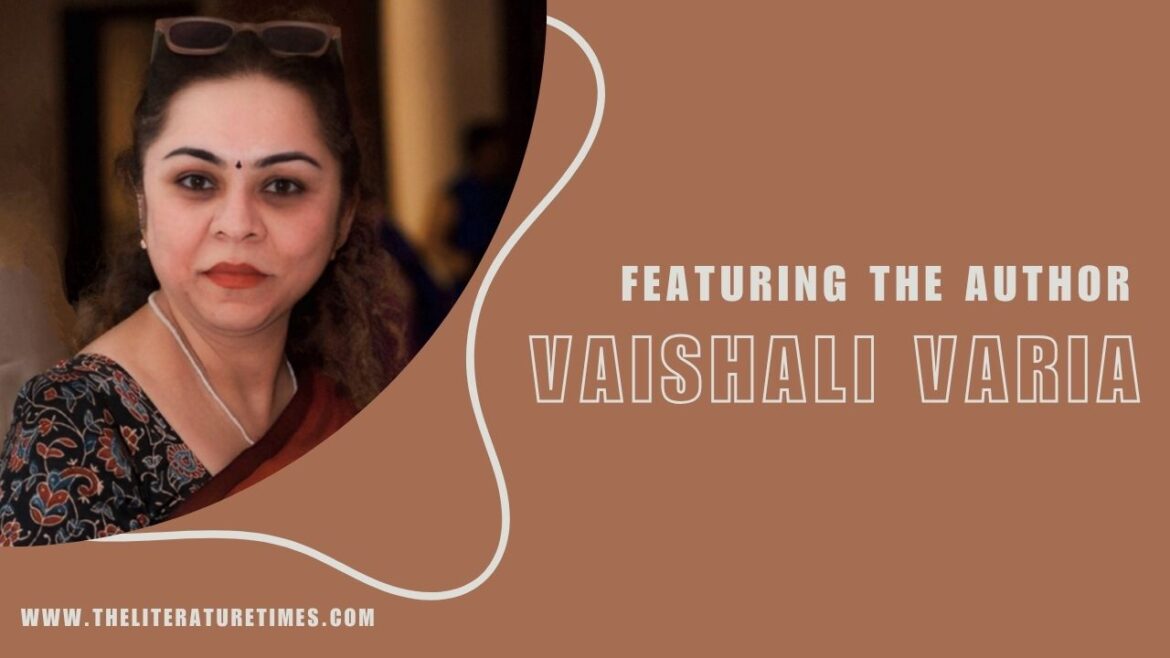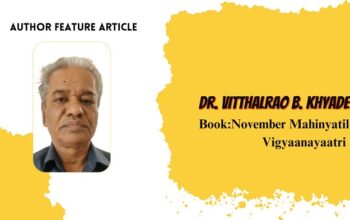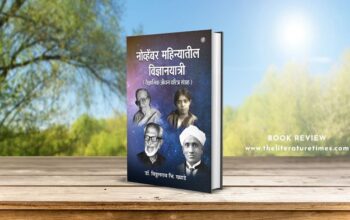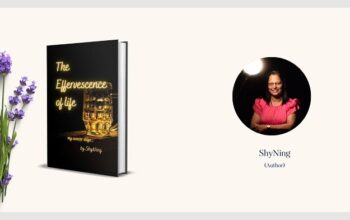Vaishali Varia is a Business professional with a multifaceted background as a Logistician, Financial Advisor, EdTech Trainer, Neuro-Linguistic Programming (NLP) coach, and an active content writer. With years of experience across various fields, she brings a unique and holistic perspective.
Vaishali’s work is driven by a deep belief that early exposure to financial concepts, combined with emotional intelligence and practical learning, can set the foundation for lifelong success. Her approachable writing style, real-world insights, and innovative ideas encourage families to integrate money conversations naturally into daily life — making learning fun, impactful, and lasting.
Through her efforts, Vaishali hopes to inspire a new generation that is not just technologically adept, but also financially wise, emotionally strong, and ready to navigate the opportunities and challenges of tomorrow’s world.
Interview with Vaishali Varia
The Literature Times: Welcome to The Literature Times, author. Congratulations on the release of your book. What responses are you getting from your readers? Please share your experience with this book.
Author: Thank you so much for the warm welcome! It’s truly an honour to be featured by The Literature Times.
The response to The Wealth Wizard has been incredibly heartwarming. Parents, teachers, and even grandparents have reached out to say how much they appreciate a book that introduces children to the basics of money in such a fun and accessible way. Since the launch is still on a very early stages, The journey of writing and publishing The Wealth Wizard has been both exciting and humbling. It’s my first book, so every milestone—from the first printed copy in my hands to the feedback pouring in—has felt like magic. I’m grateful to everyone who’s joined me on this journey, and I’m especially thrilled that the message of financial literacy is resonating with so many families.
The Literature Times: What encourages you to become an Author?
Author: The idea for The Wealth Wizard came from observing how curious and capable children are when it comes to understanding the world around them. I realised that if we can explain complex concepts like money, saving, and investing in a way that’s engaging and age-appropriate, we can equip the next generation with tools that will serve them for life. This is a common practice which both, my husband and me have inculcated with my daughter from an early age.
I’ve always loved storytelling, and this felt like the perfect way to combine creativity with purpose. The encouragement also came from seeing a gap in children’s literature—there weren’t many fun, relatable books about money—and I felt driven to help fill that space. The positive response so far has only strengthened my motivation to keep writing and sharing ideas that matter.
The Literature Times: What are your favorite topics of writing? Please tell us something about your interest areas in the literature.
Author: My favourite topics of writing revolve around personal growth, financial literacy, and values-based living—especially when these can be simplified and made engaging for children and young readers.
I’m particularly drawn to writing that empowers, educates, and sparks curiosity, while still feeling warm and relatable with the readers.
The Literature Times: We were hoping you could tell us about some of those writers who had inspired you and whom you follow!
Author: Absolutely! There are several writers who have deeply inspired me—both in their storytelling style and in the values they communicate through their work.
I draw inspiration from Indian storytellers like Ruskin Bond, whose simplicity and emotional depth have always resonated with me, and Sudha Murty, who beautifully weaves values into everyday stories in a way that appeals across generations.
For children’s literature, I’ve always admired Roald Dahl. His ability to blend humour, imagination, and life lessons is unmatched. Books like Charlie and the Chocolate Factory or Matilda aren’t just fun—they’re empowering, with strong messages about kindness, resilience, and using your mind.
In the world of personal development and financial thinking, authors like Robert Kiyosaki (Rich Dad Poor Dad) and Morgan Housel (The Psychology of Money) have had a big impact on me.
Whether I’m writing for children or adults, my goal is always the same: to connect, to inspire, and to leave the reader just a little wiser than they were before.
The Literature Times: The titles seem different and catchy; how you decided it? Please let us know the story behind it.
Author: Thank you! I’m so glad you found the title The Wealth Wizard catchy.
The word Wealth in the title was very intentional. I wanted to go beyond just money and Wealth can mean knowledge, values, choices, and the freedom that comes from understanding how to manage what you have.
And the word “Wizard” came from mystical wizards. Wizards are wise, powerful, and often guide others through mysterious worlds. It felt like the perfect metaphor for learning something as powerful and important as handling money wisely.
So The Wealth Wizard is not just about coins and notes—it’s about building a mindset and creating a future ready generation! The title came together as a symbol of what I wanted the book to be: a magical, memorable journey into the world of smart, kind, and thoughtful decision-making.
The Literature Times: What are your achievements so far? Tell us something about your writing career.
Author: Thank you for asking—it’s been a very meaningful journey so far.
The Wealth Wizard is my debut book, so in many ways, this marks the beginning of my formal writing career. But even before the book was published, I’ve always had a passion for storytelling, communication, and creating content with purpose. Writing has been a quiet companion in my life for years—whether it was journaling, blogging, or drafting ideas for future books.
One of the biggest achievements has been the reception The Wealth Wizard has received from both parents and educators.
The book has sparked conversations in families and schools about saving, spending, and understanding value, which is exactly what I’d hoped for.
Another personal milestone was being featured in interviews and literary platforms like The Literature Times—that recognition has been both humbling and motivating. I’ve also had the opportunity to speak at a few school events and community gatherings, which has opened doors to further engage with young readers directly.
While I’m still early in my writing career, The Wealth Wizard has laid a strong and purposeful foundation.
The Literature Times: What is your current goal in writing a career? How do you see your future in writing?
Author: My current goal in my writing career is to continue creating meaningful, engaging stories that educate and empower children—especially in areas that are often overlooked.
I’d also love to create interactive content, like activity books, school workshops, and even digital tools that bring these lessons to life beyond the page.
The Literature Times: Are there any other books being worked by you? Please let us know about your future projects.
Author: Yes, absolutely! I’m very excited to share that I’m currently working on the next book in what I hope will become a series following The Wealth Wizard. Intention is to focus on a different life skill or value and build further on.
Since, I am at very embryonic stage of writing, I wish to be more thoughtful about the topics and content.
The Literature Times: How you see Indian writing in the 21st century? What changes do you see in the modern way of writing? Do you feel it has been changed by the time?
Author: One of the biggest changes I see is the shift in storytelling style—modern Indian writing is becoming more conversational, more relatable, and more accessible. Writers are embracing simplicity and clarity without losing depth, which allows them to connect with wider audiences, including younger readers and global markets.
Another important evolution is in representation. Today’s Indian writers are telling stories from different regions, communities, and perspectives—voices that were previously underrepresented are now finding platforms.
So yes, writing has absolutely changed with time—but I believe it’s for the better.
The Literature Times: How easy/ difficult it was for you to publish your book? What message would you like to give to budding authors?
Author : Publishing The Wealth Wizard was both a rewarding and a challenging journey. As a first-time author, there was a lot to learn—right from editing and design, to understanding the publishing process, marketing, and distribution. The most difficult part wasn’t writing the story—it was navigating the world of publishing with no prior experience. There were moments of doubt, delays, and decisions I had to make without always knowing if they were the right ones.
But what made it easier was staying focused on why I was doing it: to create something meaningful.
To budding authors, my message is simple: don’t wait for perfect conditions to start. Start with your idea, your heart, and your pen. The rest you’ll learn along the way.
Also, be true to your voice. There’s room in this world for your unique story. Write what moves you, not what you think will sell. And finally, be patient and persistent. Publishing is a marathon, not a sprint.
Book Title : The Wealth Wizard – Spells for Kids on Saving and Growing Money!
Publisher : Evincepub Publishing



